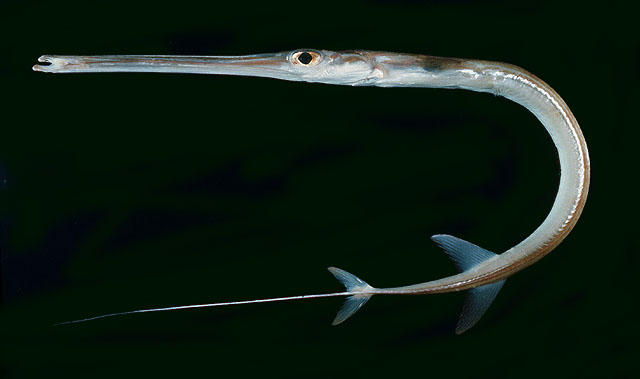
|
Fistularia petimba Lacepède, 1803 Red cornetfish |
||
Red cornet fish Trompeta, Agpang, Bali-bali, Droal, Gong-gong, Kurukur, Ongok, Pistola, Red cornetfish, Sikwan, Stick fish, Sunugan, Torotot, Torotot, Torotot, Torotot, Torotot, Trompeta, Trompita, Trumpetfish, Tubo-tubo, Tubo-tubo, Tubo-tubo, Tubo-tubo, Ungnguk, |
||

|
|
photo by
Randall, J.E. |
| Family: | Fistulariidae (Cornetfishes) | |||
| Max. size: | 200 cm TL (male/unsexed); max.weight: 4,650.0 g | |||
| Environment: | reef-associated; depth range 10 - 200 m | |||
| Distribution: | Western Atlantic: southeastern Florida, USA to Central America according to Ref. 7251, Massachusetts to southern Brazil (Ref. 47377). Also found in Argentina (Ref. 86323). Eastern Atlantic: Galicia, Spain (Ref. 74931), Cape Blanc and Cape Verde to Angola (Ref. 6557). Reported from Walvis Bay, Namibia (Ref. 4272). Indo-Pacific: Red Sea and East Africa to the Hawaiian and Tuamoto islands, north to southern Japan and the Ogasawara Islands, south to Victoria, Australia (Ref. 33390). This name has often wrongly been used for the more common Fistularia commersonii (Ref. 2334). Mediterranean: Cadiz, Spain (southern Iberian Peninsula) (Ref. 34227). | |||
| Diagnosis: | Dorsal spines (total): 0-0; Dorsal soft rays (total): 13-15; Anal spines: 0-0; Anal soft rays: 14-15. With a row of bony plates along the midline (absent in F. commersoni); reddish or brownish-orange in color (whereas F. commersoni is greenish-brown). | |||
| Biology: | Found in the sublittoral zone (Ref. 11230); inhabits coastal areas over soft bottoms, usually at depths greater than 10 m (Ref. 30573). Benthopelagic (Ref. 58302). Feeds on small fishes and shrimps (Ref. 3401). Maximum length reported is 200 cm TL (Ref. 26999), however, no specimen over 100 cm is known to J.E. Randall (Ref. 11441). | |||
| IUCN Red List Status: | (Ref. 96402) | |||
| Threat to humans: | harmless | |||
| Country info: | Reported in San Juan, Batangas (Ref. 107854). Recorded from the Visayan Sea (Ref. 110387) and Leyte Gulf (Ref. 68980). One specimen (63.9 cm TL) collected by an otter trawl in 115-144 m (Ref.95664). Also Ref. 393, 9826. | |||
| Entered by: Froese, Rainer - 01.05.91 |
| Modified by: Freire, Katia de Meirelles Felizola - 24.01.11 |
| Checked by: Casal, Christine Marie V. - 12.09.95 |